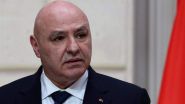
For over five decades, many Arab leaders have blamed Israel’s alleged intransigence, belligerence, and unfulfilled promises for the persistent failure to achieve Arab-Israeli peace. Yet, Lebanon’s handling of the November 2024 Cessation of Hostilities agreement with Israel tells a different story—one where Lebanese leaders, particularly Speaker Nabih Berri and Hezbollah, have reneged on commitments and deflected blame onto Israel for their own failures.
This pattern of shifting terms and evading accountability, also evident in historical Palestinian dealings, suggests that Israel’s insistence on clear, sequenced agreements may be justified.
The current crisis between Lebanon and Israel began on October 8, 2023, when Hezbollah launched its “War to Support Gaza” against the Jewish state, one day after Hamas’s unprecedented attack—the deadliest in Israel’s history, killing over 1,200 civilians and soldiers and taking hundreds hostage.
Hezbollah’s aggression from Lebanon’s southern border opened a second front, stretching Israel’s military resources. Under US pressure to prevent a full-scale war with Hezbollah, whose arsenal rivaled that of a medium-sized European army, Israel proposed an unconditional ceasefire.
Hezbollah’s leader, Hassan Nasrallah, perceiving weakness, rejected the offer, demanding that any cessation be tied to ending the Gaza conflict. Israel, unwilling to cede control of its sovereign decisions to a Lebanese militia, refused and launched a devastating campaign that dismantled Hezbollah’s military infrastructure, killed Nasrallah, and eliminated dozens of his top commanders by September 2024.
Nasrallah’s death loosened Hezbollah’s grip on Lebanon, creating a diplomatic opening. Berri, a long-time Hezbollah ally, sought international intervention to halt Israel’s operations, pledging to implement UN Security Council Resolution 1701, which mandates disarming all armed groups, including Hezbollah, and establishing a demilitarized zone south of the Litani River.
In November 2024, the US brokered a Cessation of Hostilities agreement with a clear quid pro quo: Lebanon would disarm Hezbollah, and Israel would cease military operations and withdraw from captured border territories used to neutralize the militia’s threat. Berri endorsed the deal, and even Hezbollah ministers in Prime Minister Najib Mikati’s cabinet voted in favor.
Yet, as of September 2025, Hezbollah remains armed, in direct violation of UNSCR 1701 and the agreement. Berri and Hezbollah have shifted the terms, falsely accusing Israel of reneging, claiming that it must first stop policing Hezbollah and withdraw from five strategic hilltops. This reversal undermines the deal’s core objective: disarmament in exchange for peace. Lebanon’s new leadership—President Joseph Aoun and Prime Minister Nawaf Salam—has pressed Berri and Hezbollah to honor their commitments. In response, they face accusations of treason and of capitulating to US ‘diktats’—the very conditions Berri and Hezbollah themselves endorsed in November 2024.
The situation was worsened by US Ambassador Tom Barrack, an inexperienced envoy to Turkey, Syria, and self-appointed mediator in Lebanon. Without consulting Israel, Barrack agreed on an outline prioritizing Israel’s cessation of operations early in the process. Lebanon’s cabinet formalized this as a decree, but Israel, unaware of the arrangement, continued targeting Hezbollah’s operatives and arms depots to prevent rearmament.
Barrack’s misstep enabled Berri and Hezbollah to accuse Israel of violating a deal it never agreed to. Barrack even criticized Israel’s “unchecked brutality” and alleged it seeks to divide Arab states, providing Hezbollah with a narrative to shift blame despite Lebanon’s clear failure to disarm the militia.
This pattern of reneging and blame-shifting echoes the Palestine Liberation Organization’s (PLO) tactics during the 1990s Oslo Accords. The two-state solution rested on a simple premise: Arafat would ensure Israel’s security by curbing Palestinian militants, and Israel would cede territory for a Palestinian state. Phased withdrawals were designed to build trust, but each redeployment was met with Hamas’s suicide bombings targeting Israeli buses, cafes, and nightclubs. Israeli leaders, facing domestic backlash for withdrawing amid violence, urged Arafat to act. Instead, he justified the attacks as responses to Israel’s “occupation,” undermining the agreement’s terms and eroding trust.
In both Lebanon and Palestine, demagoguery overshadowed leadership. Berri and Arafat prioritized populist rhetoric over delivering on promises, fearing domestic criticism. They deflected failure by blaming Israel, often citing fringe Israeli statements as evidence of “hidden intentions.” Hezbollah’s accusations against Aoun and Salam mirror Arafat’s excuses for Hamas’s violence.
Israel’s insistence on sequenced agreements—disarmament or security before concessions—stems from these experiences. Critics may call this inflexibility, but it reflects pragmatism born of decades of broken promises. Until Arab leaders uphold their commitments rather than manipulate narratives for political gain, peace agreements will yield more war than resolution, and Israel’s skepticism will remain justified.




Comments